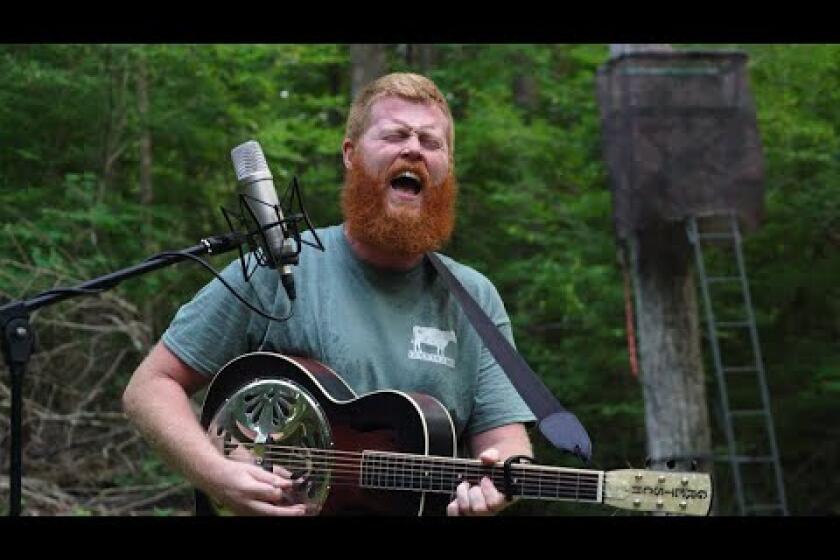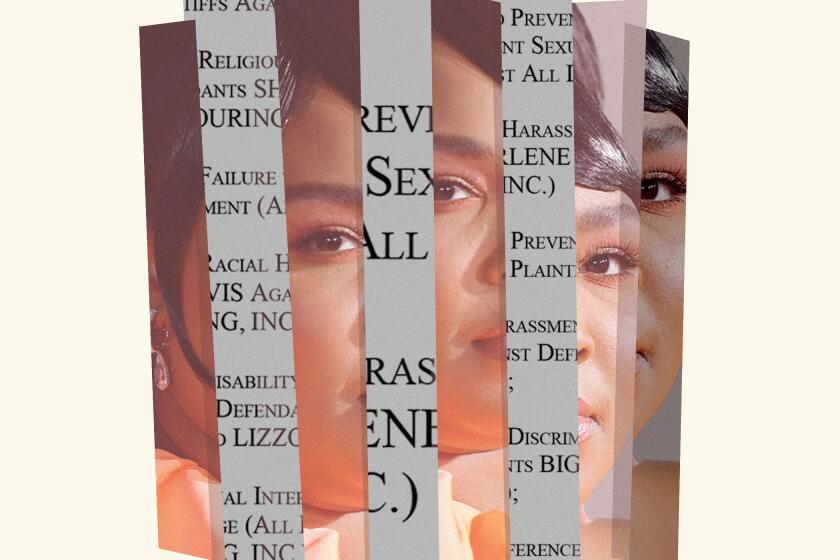Morgan Wade isn’t going to let anything stand in her way. Least of all those tabloid rumors
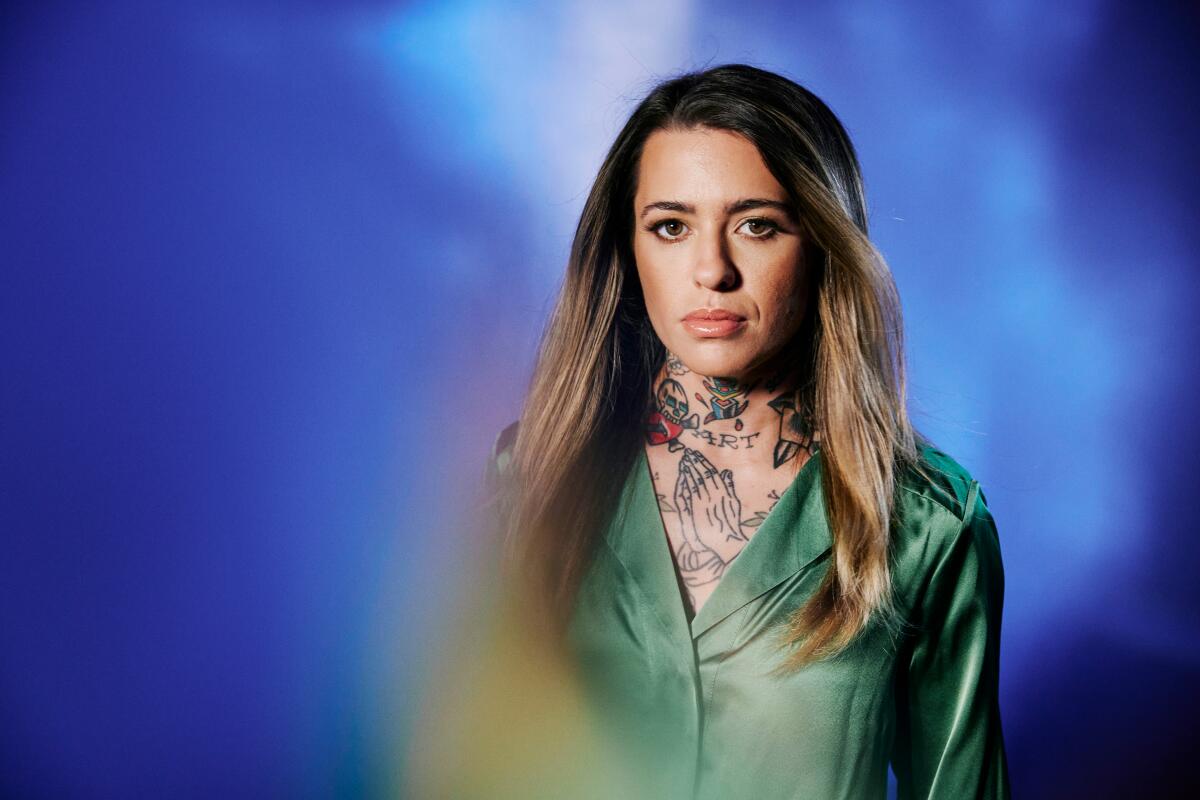
- Share via
Morgan Wade could’ve bailed altogether on the 90-minute run we had planned. She had a solid excuse: a pulled muscle in her back from the previous day’s weightlifting session. But since she’s the type who prides herself on her fortitude, she arrived at an East Nashville park in sneakers, baggy sweatpants and a ballcap and T-shirt from Max Effort, an athletic brand that she reps, every inch of visible skin up to her chin spider-webbed in tattoos. Even if she couldn’t run, she’d at least stride up and down the greenway for a half-dozen miles with the resoluteness of someone perpetually primed to step up to a fight.
This was all part of Wade’s preparation for a gantlet of her own design. After touring hard all year, on Friday, the 28-year-old singer-songwriter will release “Psychopath,” her second album and the first she’s made for a major label, and promote it across the U.S. and Europe. During her one free weekend in November, she’ll squeeze in a 100-mile trail ultramarathon, with the goal of covering that distance in 30 hours or less. Two weeks later, she’ll undergo a double mastectomy, a major surgery meant to prevent the breast cancer for which she’s genetically predisposed as a carrier of a harmful RAD51D gene mutation.
“I know I’m going to be down for the count for about a month, and that’s going to bother the hell out of me,” she said, impatient with the very prospect of having to take recovery time. “I cannot sit still. So I want to do something extreme, get it done.”
Wade discovered ultra running in 2020, when the pandemic interrupted the completion of her debut album, “Reckless.” “It bothered me so much that people were doing stuff like that,” she recalled. What irked her wasn’t the fact that people were embarking on slogs through the woods that could stretch across day and night, but that she didn’t even know that tackling such a challenge was an option. She started signing up for trail races, working her way up to 50-milers.
With its red-blooded hooks and startlingly forward depictions of expressing need, “Reckless,” released through the Nashville indie label Thirty Tigers, caught on with a broad cross-section of fans. Rolling Stone crowned it country album of the year, and for a debut, it did respectably not only on the country charts, but folk, Americana and pop too.
A surefire way to bore Wade is to ask which of those lanes she thinks her music belongs in. “Anything I sing, you’re going to assume it’s country music just with my accent,” she said. “But I like that I’m able to reach people that like country or rock or pop. I’m not in one box.”

As easy as it would be to sell Wade as some dramatic, heavily tattooed disrupter of industry conventions, that would be less compelling than watching how she navigates one of the most deferential, image-conscious genres in all of popular music while coolly prizing her autonomy.
“She’s not one to walk into a room and let someone tell her how to dress or how to talk or how to act or what to think,” her mother, Robin Fonville, told The Times. “She’s the one that’s calling the shots, and she always has.”
The one thing that forced Wade to spend far more mental energy than she’d like on managing her image this summer was the breathless tabloid conjecture that her friendship with Kyle Richards, of “The Real Housewives of Beverly Hills” fame, was actually a romance. “They’re just making [stuff] up,” she said dismissively.
Wade is unfazed by the rules of gender performance that have held sway in country music throughout her lifetime: that women should default to the high-femme, with occasional detours into tomboy toughness, while men embody stoicism and strength. On “Psychopath,” she is venturing farther down a path mapped out by the likes of Miranda Lambert and Ashley McBryde, but she’s also looking beyond their realm, not only to the singer-songwriter idiosyncrasies of the Americana scene, but the lacerating angst of ‘90s alternative music. “Psychopath’s” alpha attitude and potent vulnerability make for one of current country music’s more bracing dispatches.
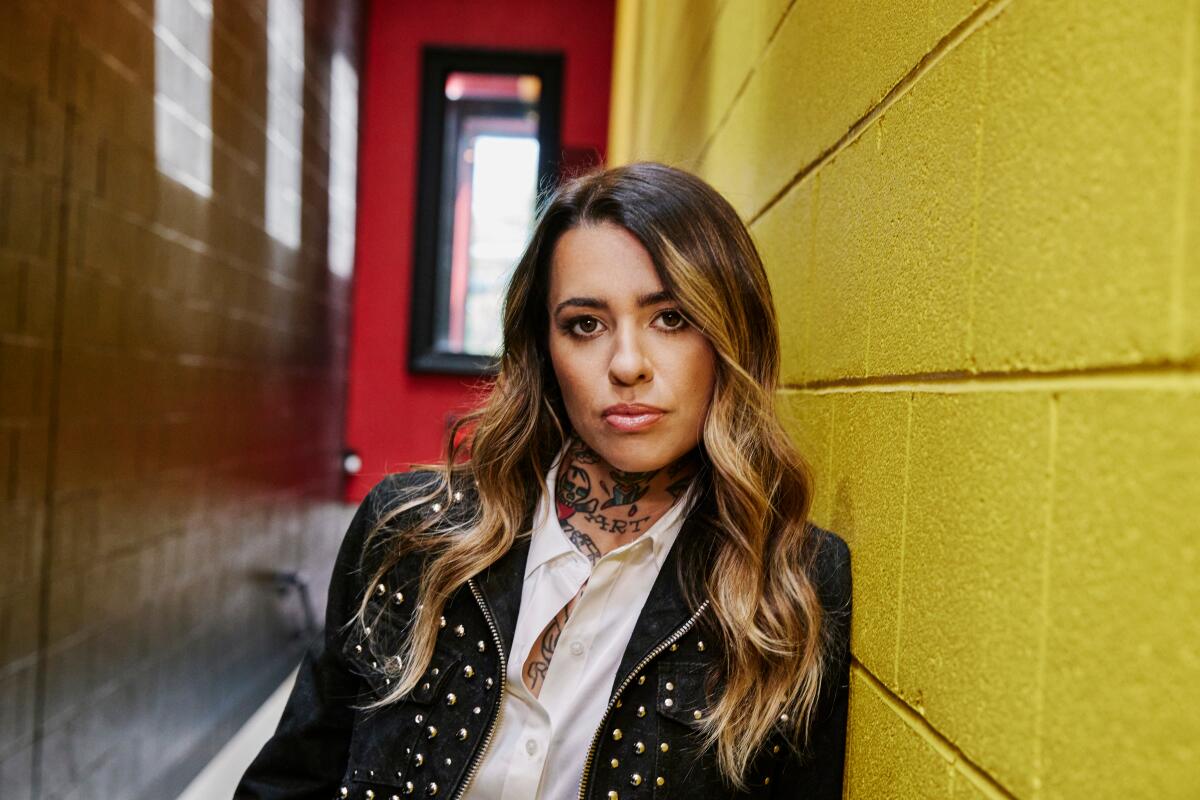
Wade comes from the tiny Appalachian town of Floyd, Va. She still lives in rural Virginia and has resisted relocating to Nashville — not an insignificant choice, since it’s nearly a given that those looking to advance in her world will move to the country music capital, not just for the sake of networking and convenience, but to signal their commitment to being good citizens of the industry. She’s not overly concerned with such politic gestures.
“I’m not going to move just to appease people,” she shrugged. “I kind of like to be left alone.”
“She really is something of an introvert,” her manager Mary Sparr said. “She’s threatens ‘I’m going to go work at the gym in my town’ when she’s really stressed out.”
Wade’s family appreciated music enough that her grandfather took her to the Floyd Country Store to hear old-time pickers on Friday nights and her grandmother bought her a guitar and lessons, but none of them actually played or sang. Their influence on her, Wade recognizes now, comes down to the fierce self-determination and resourcefulness they modeled.
“Some of the smartest, most hard-working people I know are from Appalachia,” she said. “Everybody in my family, they don’t work for anybody else. They start their own businesses.” Timber and construction outfits, for instance. Wade watched her mother, who had her at 17, return to school to become a nurse. “That was instilled in me, because I don’t like to work for anybody else. I’m more of a doer than a listener.”
A few weeks ago, Oliver Anthony was an unknown. Today, thanks to a bare-bones song and video heralded by right-wing pundits, he sits atop the Billboard Hot 100.
As a kid, Wade kept her singing and songwriting to herself. Through attending a “real strict Baptist church” with her grandmother and watching the behavior modeled by adults around her, she could make out the morally upright, prescribed path she figured she was supposed to follow into womanhood: Marriage and child-rearing were the ultimate destination, and there were to be no tattoos or drinking on the way.
Wade attended college only about an hour away from home, but that was far enough to give her a chance to find herself. Soon, she discovered that she actually liked sharing her songs with others in the dorm, and beer, and getting inked, though she initially confined the designs on her skin to easily covered areas, since she planned to go on to medical school.
“I went from being so guarded,” she recalled, swatting gnats away from her face as she strode down the park greenway, “and then I just started having these experiences and kind of being in this deconstruction of, ‘Did I really truly believe this or did I let other people influence my thoughts?’”
Early articles on Wade spread the lore that she only started a band in college so that she could win back an ex, and that the magnetic exigency of her songs worked on him so well that they got back together. The accuracy of that tale is less important than what it says about Wade’s ability to make grand gestures, and to sound persuasive and powerful, even when she’s singing from a wounded posture. For her, playing shows and getting hammered went hand in hand, until the excess plunged her into a truly dark place psychologically and she decided she had to stop.
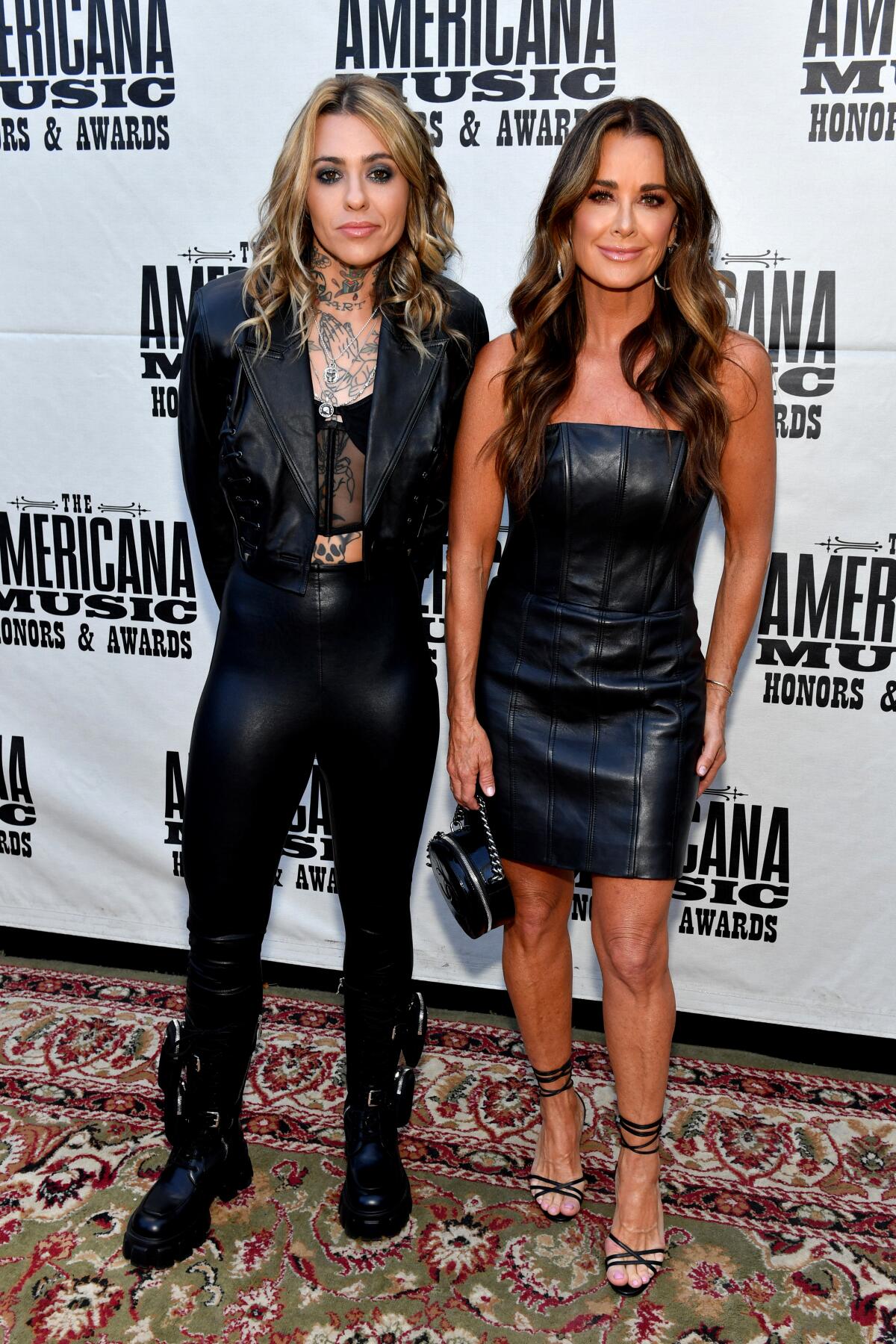
In 2018, the sound engineer for the Southern-accented rock outfit Jason Isbell and the 400 Unit happened to hear her on the local stage at Floyd Fest, and alerted the band’s guitarist Sadler Vaden that he needed to check out this unknown who sounded like “a female Tyler Childers,” a Kentuckian known for his parched, cutting, old-timey vocal attack. What Vaden heard moved him to reach out. “Her voice is like a wild horse, you know?” he said, searching for a suitable description. “It’s not necessarily controlled, but it’s so beautiful.”
Connecting with Vaden and another producer, Paul Ebersold, who came up in Memphis rock and soul, as opposed to any number of slick Music Row collaborators, made a difference in how Wade experienced the music-making process, and to the end result. She was cautious about co-writing at first and didn’t much care for studio recording either. Vaden found a way to free her up: “I told her, ‘Look, if you just sing like you mean it from take one, then you can leave.’”
Following the reception for 2021’s “Reckless,” Wade found it tedious entertaining the overtures of the larger labels that started taking interest. She pressed the executives about what they could do for her and what they would want to change about her music. The head of Sony Music Nashville, Randy Goodman, was on vacation during her uneventful meeting with others at the company. But his son happened to be a Wade fan and insisted that his dad needed to listen to “Reckless.”
“From that very moment,” Goodman recalled, “I was just hooked by her writing ability, but also the vulnerability. She was very explicit even from a sexual perspective. There was nothing veiled in this.” Goodman returned home determined to sit down with Wade, something that might not have happened if Sparr hadn’t persuaded her client to go through with it.
In Wade’s book, Goodman took exactly the right approach: “He came in there like, ‘I’m obsessed with this lyric. How did you write it?’” They did breakfasts, lunches, steak dinners. “I made that man work so damn hard,” she bragged. Then she laid out a final condition: If Goodman bought her the French bulldog puppy she’d found online, she would not only sign, she’d name the dog “Sony” to seal the deal. Goodman sent Wade the money out of his own pocket, Sony the dog came to live with her, and Sony the label released an expanded version of “Reckless,” including a sulky cover of the Elvis Presley hit “Suspicious Minds.”
Being on a major label roster didn’t have much of an effect on Wade’s approach to making “Psychopath.” “Essentially, the label’s a bank,” she reasoned. “They allow me to be able to pay for this record, and they stay out of it.”
She never even considered bringing in a big-name producer, content to continue her collaboration with Vaden. Nor did she aim for the narrow parameters of what country radio might play. That was fine by Sony, Goodman said: “It really is about getting her music out there as broadly as we possibly can in the viral world that we live in.”
Lizzo is facing a lawsuit from former backup dancers that threatens to undo her hard-won image as a beacon of empowerment and self-acceptance.
Wade’s biggest concession to standard Nashville practices was widening her circle of co-writers. The credits on “Psychopath” include a host of women — Natalie Hemby, Lori McKenna, Liz Rose, Hillary Lindsey, Ashley Monroe, Angaleena Presley and Julia Michaels among them — recognized for their abilities to embroider country, roots, pop and rock material with narrative detail and emotional acuity. Presley, a sharp-witted storyteller who also hails from Appalachia, felt instant recognition when she met Wade for the first time at their writing session. “She just has a presence about her that feels so honest and open, yet at the same time, ‘Don’t mess with my [stuff],’” Presley remembered.
What Wade was looking for that day from Presley and Monroe, who was also part of the session, was help writing a ballad so forward about acting on lust, and so clear that the sex in question is a casual hook-up, that it feels almost brazen next to what tends to pass for suggestive material in country. Presley summarized the spirit of the slow-burning, country-soul number they came up with, simply titled “Want,” as, “I know what I want, and I’m going to go get it, and I’m not going to be scared to talk about it.” Wade’s performance oscillates between insistent, pained and pleading. “When she’s telling me she knows what she wants,” Presley said, “I believe her.”
Wade is one of a small number of country-leaning acts that were booked to play Lollapalooza, and at many of her recent shows, her walk-on music has been “Closer” by Nine Inch Nails, a time capsule of brutal carnality straight out of 1994, the year she was born. “Psychopath’s” brooding “27 Club” distantly echoes the alt-rock decade’s fallen hero, Kurt Cobain, while Wade ponders and accepts the bleak prospect of enduring depressive thoughts in perpetuity.
Country music is full of songs invoking venerated elders like Dolly, Loretta, Hank, Willie and Waylon with first-name familiarity. Wade’s version is “Alanis,” addressed to that ‘90s archetype of daringly self-aware female rage. “Alanis, your anger was a medicine I didn’t know I would need,” Wade sings of Morissette, hardening the edges of her drawl. “I’m finding that there’s not much difference between you and me.”
Back in April, Wade was one of four artists, all women, selected to join Morissette for a group rendition of the score-settling anthem “You Oughta Know” on the CMT Music Awards. Wade seemed to grasp the song’s meaning best; next to the others’ exuberant gestures, she was almost seething.
“When it comes to raw, alternative music, she really did come in there and say, ‘Go down on you in a theater,’” Wade said admiringly. “She was just so authentic with what she wanted to say. I strive to be like that.” That also goes for Morissette’s longtime refusal to satisfy intense curiosity about that song’s target: “She’s never said, to this day, who that song was actually about. I connected with that.”
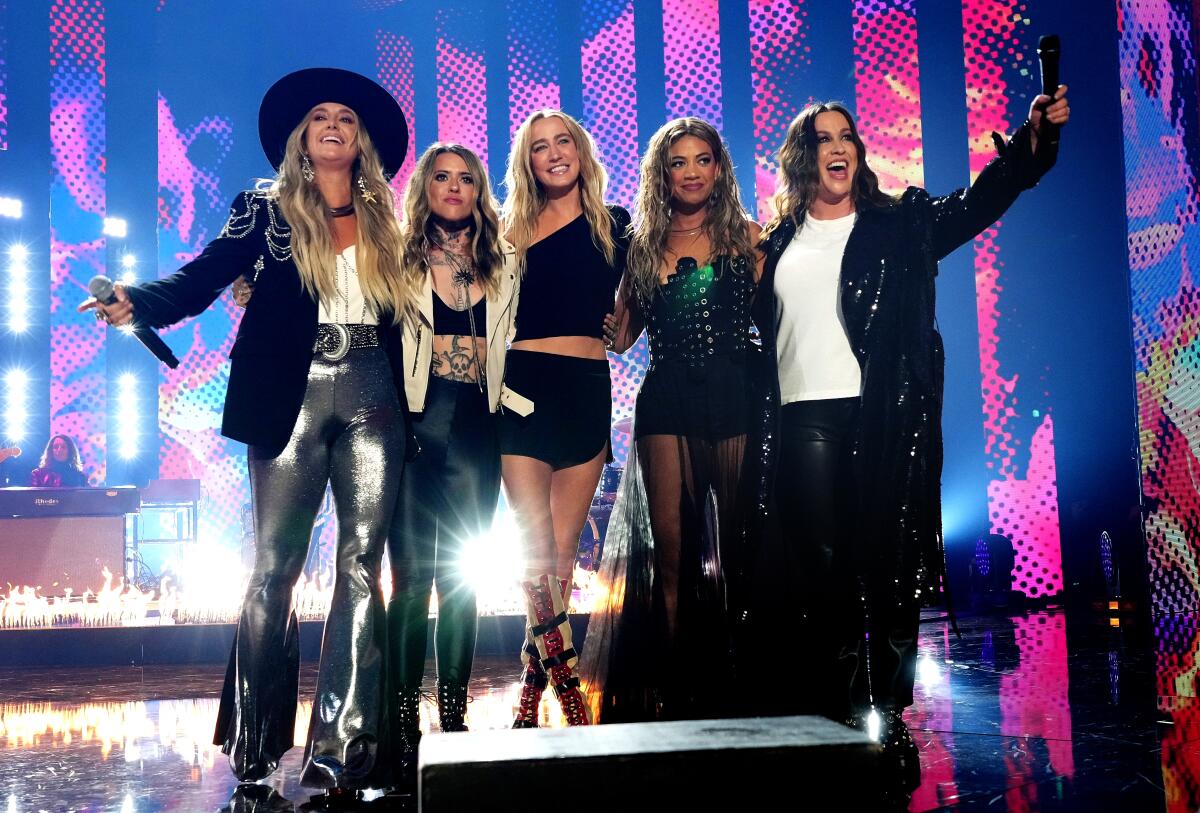
Wade never dishes about the entanglements that provide her own songwriting inspiration, and she would’ve much preferred her private life not become the subject of tabloid scrutiny. That’s routine for 54-year-old “Real Housewives” star Richards, whose life has been televised and sensationalized for more than a dozen years. In July, celebrity gossip sites speculated that Richards’ marriage was over and seized on photos of her and Wade hanging out as evidence that they were a thing. Blog posts fixated on who this newly celebrity-adjacent country artist was. Wade brought her distress over the situation to her therapist, got off social media and refused to dignify the rumors. “Some of this stuff is so damn far-fetched that I’ve had to laugh about it,” she scoffed. “I’m a real ... person. And I haven’t really been treated like that.”
Ultimately, though, she concocted the cheekiest imaginable response: a video for “Psychopath”’s “Fall in Love with Me” that dramatizes the attraction between Richards and her with high-camp heat. The original vision started to come together before their friendship generated such interest. “We were interested in putting a same-sex couple in it from the beginning,” said Sparr, “but had not even considered Kyle.”
They eventually concluded that she was an obvious choice. In the clip, Wade and Richards play next-door neighbors, furtively feasting their eyes on each other’s spandex-clad bodies while slo-mo shots of water drip, spray and pour from a bottle, a hose, a sprinkler, a sponge. The final scene shows Richards visiting Wade at home, bouquet of roses in hand, and Wade devilishly winking at the camera before shutting the door. It’s a statement, all right — not a confirmation or a denial, but a seizing of the moment to tantalize the world with possibility: So what if they were?
Wade posted the video on socials, calling it “important and representative of all kinds of love.” Fully half of the comments that poured in were fire emojis, and the rest offered an array of interpretations of what the video means; some thought it was Wade coming out, while others saw it as LGBTQ+ allyship or getting the best of the tabloid trolls.
“I guess you could argue that there are eyes on her because of it, but most of her fan base has no interest in it,” Sparr said. “The tabloid stuff is the least interesting stuff about her.”

Outside of her songwriting, what Wade’s most comfortable sharing is how she disciplines and cares for her own body. She’s posted gym-rat pics of workouts, challenged listeners to join her in building six-pack abs and publicly shared the news that she’s chosen to undergo surgery to prevent breast cancer.
“I would rather do that now and then not have cancer later,” she explained. “I’m all about trying to be healthy.” She saw a maternal aunt receive treatment for breast cancer, and her mother, who was also at risk, undergo a double mastectomy. After that experience, Fonville talked her daughter through the decisions to get tested for the gene mutation and proceed with surgery. “It was a huge relief,” said Fonville. “I mean, she’s a year younger than my sister was at her diagnosis. And I know what my mom went through, seeing her daughter fight for her life like that.”
A couple of months back, Wade also posted about living with Tourette syndrome, a condition she’s been managing since she was diagnosed in her teens. At times, people take her involuntary movements to mean that she’s shaking her head “no.” But when Wade truly intends to convey that she won’t be complying with a request, say, a professional obligation that she sees little value in, the message is unambiguous.
“I have to remind myself, ‘Hey, you always said no when you didn’t want to do something,’” she said. “‘So continue to do what you want to.’”
More to Read
The biggest entertainment stories
Get our big stories about Hollywood, film, television, music, arts, culture and more right in your inbox as soon as they publish.
You may occasionally receive promotional content from the Los Angeles Times.
